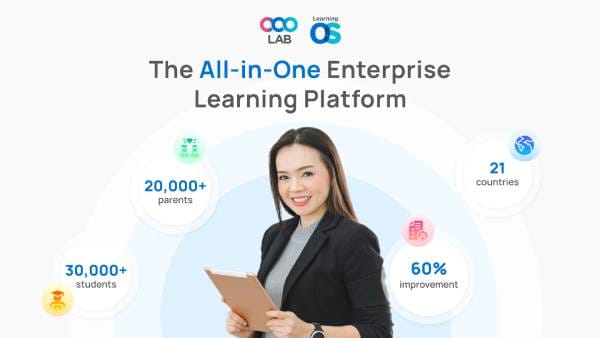The increasing need for hybrid and remote work setups has led organizations globally to seek adaptable approaches for training and educating individuals. Therefore, incorporating hybrid learning into your company's LMS is essential in 2024. However, choosing an LMS that is suitable for online and hybrid education is crucial to your business. Then how to choose the right LMS for online and hybrid learning? Let's find out more in this article

I. What is hybrid learning?
Hybrid learning is a versatile educational method allowing learners to participate in classes either in person or virtually, simultaneously. This approach offers learners the freedom to choose their preferred mode of attendance without constraints. Particularly during the pandemic, this flexibility has addressed numerous challenges in both education and corporate training.
Furthermore, hybrid learning enables learners to access course materials beyond the physical classroom, at their own convenience. Additionally, instructors can teach both in-person and virtual learners concurrently, employing tools like video conferencing.
>>> Read more: How did we transform learning experience of 30000 learners?
II. What is online learning
Online learning, also known as e-learning, is an educational approach that primarily takes place over the internet or through digital platforms. It involves the delivery of educational content, instruction, and interaction between teachers and students via digital tools and technologies. Online learning can encompass a wide range of activities, including watching pre-recorded lectures, participating in virtual discussions, completing assignments digitally, and taking assessments online.

It offers flexibility in terms of when and where learning takes place, often allowing students to study at their own pace and fit their education around other commitments. Online learning has become increasingly popular in recent years due to its accessibility, convenience, and the growing availability of digital resources and learning platforms.
III. How does LMS help with eLearning?
An LMS plays a crucial role in facilitating eLearning by providing a centralized platform for the administration, delivery, and management of online learning activities. Here's how an LMS helps with eLearning:
- Content Management: LMS platforms allow educators to upload, organize, and distribute learning materials such as documents, videos, presentations, and quizzes.
- Access Control: LMS systems offer access control features, ensuring that only authorized users (students, instructors, administrators) can access specific content or features.
- Learning Delivery: LMS platforms deliver learning content to students asynchronously or synchronously, enabling them to engage with course materials at their own pace or in real-time.
- Assessment and Evaluation: LMS systems facilitate the creation and administration of assessments, quizzes, and assignments. They also automate grading processes and provide feedback to students.
- Communication and Collaboration: LMS platforms typically include communication tools such as discussion forums, messaging systems, and video conferencing capabilities, fostering interaction and collaboration among students and instructors.
- Progress Tracking: LMS systems track students' progress and performance, allowing instructors to monitor their engagement, completion rates, and performance on assessments.
- Personalization and Adaptability: Some LMS platforms offer features for personalized learning, allowing instructors to tailor content and learning pathways to individual students' needs and preferences.
- Administrative Functions: LMS systems include administrative tools for course enrollment, user management, reporting, and analytics, streamlining administrative tasks for instructors and administrators.
IV. LMS selection criteria for hybrid/online learning
Selecting an LMS for hybrid or online learning requires careful consideration of several key criteria to ensure it meets the needs of both learners and instructors. Here are some important factors to consider:
- Flexibility and Compatibility: The LMS should support both in-person and virtual learning environments seamlessly, accommodating various formats such as live sessions, recorded lectures, discussion forums, and interactive activities.
- Accessibility and Usability: Ensure the LMS is user-friendly and accessible to all learners, including those with disabilities. It should be compatible with different devices and screen sizes to facilitate learning from anywhere.
- Content Management: Look for an LMS that enables easy creation, organization, and sharing of multimedia content, including videos, presentations, documents, and interactive materials.
- Communication and Collaboration Tools: The LMS should include robust communication features such as messaging, discussion forums, and video conferencing capabilities to facilitate interaction and collaboration among students and instructors.
- Assessment and Feedback: Choose an LMS with flexible assessment tools for creating quizzes, assignments, and exams. It should support various question types, automated grading, and provide timely feedback to learners.
- Integration and Interoperability: Consider whether the LMS can integrate with other systems and tools used in your organization, such as video conferencing platforms, content repositories, and learning analytics tools.
- Analytics and Reporting: Look for an LMS that provides comprehensive analytics and reporting capabilities to track learner progress, engagement, and performance. This data is valuable for assessing the effectiveness of the learning experience and identifying areas for improvement.
- Security and Privacy: Ensure the LMS prioritizes data security and privacy, with features such as role-based access controls, encryption, and compliance with relevant regulations such as GDPR or FERPA.
- Support and Training: Evaluate the level of support and training provided by the LMS vendor, including documentation, user guides, tutorials, and technical support services to assist both instructors and learners.
- Scalability and Customization: Consider whether the LMS can scale to accommodate growing numbers of users and courses. Additionally, look for customization options to tailor the platform to your organization's specific needs and branding requirements.
Customize and utilize your LMS today

V. Key features of LMS for hybrid/online learning
Selecting an LMS for hybrid or online learning requires careful consideration of several key criteria to ensure it meets the needs of both learners and instructors. Here are some important factors to consider:
1. Virtual classroom
The virtual classroom feature of an LMS is a crucial component for facilitating real-time, interactive online learning experiences.
The virtual classroom feature of an LMS enables educators to deliver engaging and interactive online learning experiences, fostering collaboration, communication, and active participation among learners in real-time.
2. Learning path
The learning path feature in an LMS (Learning Management System) enables instructors to design and deliver structured learning experiences tailored to the needs and goals of learners.
Overall, the learning path feature in an LMS empowers instructors to design coherent, personalized learning journeys that guide learners towards achieving their learning objectives effectively and efficiently.
3. Reporting and analytics
The reporting and analytics feature of an LMS (Learning Management System) provides valuable insights into learner engagement, progress, and performance, enabling instructors and administrators to make data-driven decisions and optimize the learning experience.
Overall, the reporting and analytics feature of an LMS empowers instructors and administrators with actionable insights and data-driven decision-making capabilities to enhance the effectiveness, efficiency, and impact of online learning initiatives.
VI. Conclusion
When selecting the appropriate LMS for hybrid or online learning, numerous factors require careful consideration. We trust that the information provided in the article is both valuable and enlightening, enabling you to make the optimal choice for your business's LMS needs.
About us
At OOOLAB (pronounced 'uːlæb'), our mission is to make complex learning operations simple. We aim to positively impact the lives of over 1,000,000 learners and educators by the end of 2026.
OOOLAB's LearningOS provides educational institutions and corporate enterprises with an all-in-one solution to create and deliver engaging learning experiences.
Reach out to us at: Linkedin, FaceBook


